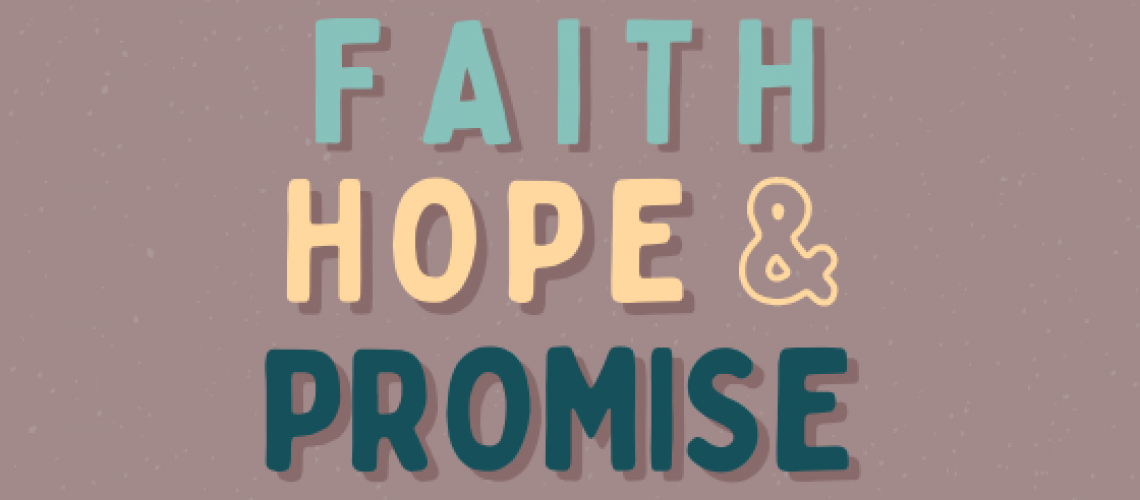“Now these three abide: faith…”
Faith, hope and promise. These three are considerably connected, as each one implies waiting for something unseen. Faith and hope also call to mind the famous verse about “faith, hope, and love.” This month on the blog, we will be diving into situations that call us to wait for a promise to be fulfilled, as well as to grow in faith, hope, and love.
This week, let’s turn our attention to a heavy, yet needful topic: mental health. According to the CDC, “more than 42% of people surveyed by the US Census Bureau in December reported symptoms of anxiety or depression in December, an increase from 11% the previous year.”1 Healthline.com reports, “Not only are 20-somethings experiencing the highest rates of loneliness right now, more 18- to 24-year-olds are also thinking about suicide.”2 If I asked a (virtual) room of people to raise a hand if they or anyone close to them has been affected by mental health issues, I am sure that every hand would be raised.
As someone who struggles with thoughts of depression and anxiety myself, I would like to offer some encouraging thoughts on this sometimes overwhelming topic. I have been interacting with these kinds of thoughts on and off for about half my life. My good days are as good as anybody’s, and my bad days make me forget what good days are. I know I am fortunate to have a loving family, church community, friends, job, economic well-being, health, and the list goes on. Yet despite all of these blessings, my struggle with mental health impacts my life in a very real way.
Granted, there are different levels of depression and anxiety. Some are relatively mild and others can be crippling. Let’s start with addressing the more “mild” variants of these challenges. I put mild in quotes because it does not feel mild to the person experiencing it. Basically, during a mild bout of anxiety or depression, you know exactly what is making you feel bad. You can be reasonably assured that once the trigger is removed and the circumstances change, you will go back to equilibrium. Because you know the reason why you feel bad, it is somewhat easier to feel that you are still in control of the situation. In other words, there is a cause to our malaise, and so we know it is bound to end at some point. Right now, that is likely what many of us are experiencing.
However, this is not always the case. Our mental health is directly affected by our physical and spiritual health. To address the spiritual aspect of mental health, the best remedy is to go to Confession. Something is bothering us spiritually, and the act of telling another person, as well as God, is just what we need. This can offer healing and an opportunity to start afresh. This is never a bad idea. The problem may also have a physical component, and I suspect with the sheltering in place and studying/working from home, that this is also causing many of us undue distress. Here, the remedy may look a bit different:
- go to bed earlier
- put your phone on airplane mode overnight
- wake up early
- go for a walk or run or do a ten-minute Youtube workout
- set aside an extra hour and prepare yourself a healthy meal made with ingredients from the farmer’s market
- journal
- meet someone for coffee or a book club
While these tips are helpful, they cannot replace the experience of talking with an intimate, trusted friend. If you’re not sure who to turn to, there are YES leaders available to talk with you. There is nothing like being heard and understood by someone who loves you and wants the best for you. It is a help that is, in a way, superior to anything you can provide for yourself. Also, you may need to consider seeking professional treatment. Therapists are like mirrors for our minds in a way that is complementary to the role friends play. There’s nothing bad that can come of seeking perspective on your situation–mental health professionals are simply there to help.
Right now, many are suffering emotionally. You might not be actively struggling with any of this right now. If so, give thanks! Regardless, this week, consider reaching out to someone whom you suspect may be having a hard time. It could mean the world to them. If you are struggling, try some of these tips and remember that, right now, you are definitely not alone in your suffering, even though you may be literally alone in your room at the moment. Our Lord knows your sufferings because He experiences them with you. As a “man of sorrows” (Isaiah 53:3), his “soul is exceeding sorrowful, even unto death” (Matthew 26:38).
As human beings, we look for purpose everywhere. In something so confusing as mental health, there is a purpose too. God is giving you this struggle to help you learn to fight for yourself and for others. Our life is a gift and it can be easy to lose sight of that at times. I would like to underline that struggling with anxiety or depression does NOT mean something is wrong with you. It does mean, though, that for a time, you are dealing with an additional challenge. For someone experiencing anxiety or depression, there are no easy answers. Rather, you are learning to rise to a new challenge every day. You can do it! “I can do all things through Christ strengthening me” (Philippians 4:13).
The journey of mental health is a journey of faith. At times, we can’t see the end, although we believe it is coming. We know that our God gives good things to those who ask Him. So let’s keep asking Him, and one day, we will hear Him say: “your faith has made you well.” Maybe sooner than we think!
Next time, we will talk about growing our hope in a season of waiting.
Catie Golitzin
Catie is a YES leader who is passionate about working with young people, especially Orthodox young people seeking to learn more about their faith, and incarnate this faith through activity in the world. She is also interested in the connection between faith, physical health, and mental health.




